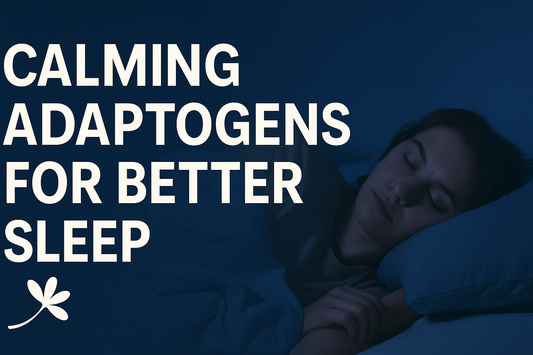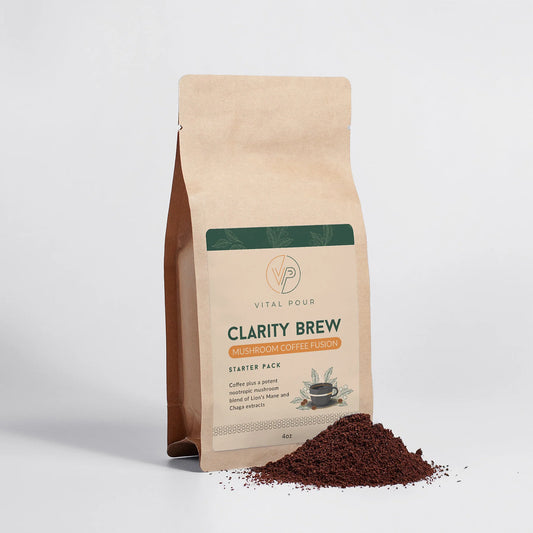If you're searching for natural ways to boost your energy without relying on coffee or energy drinks, you're not alone.
While caffeine offers a quick fix, it often leads to energy crashes, poor sleep, and long-term fatigue.
This article explores sustainable, stimulant-free strategies—including sleep optimization, stress reduction, nutrient support, and natural compounds like adaptogens and nootropics—that can help you maintain steady, long-lasting energy throughout the day.
The Pitfalls of Over-Reliance on Caffeine

Before diving into alternatives, it's worth understanding why solely depending on caffeine isn't ideal for sustained energy:
- Borrowed Energy: Caffeine blocks adenosine, a neurotransmitter that signals tiredness. It doesn’t create new energy; it merely masks fatigue, often leading to a more significant crash later.
- Adrenal Strain: Chronic high caffeine intake can contribute to HPA axis dysregulation (often referred to as adrenal fatigue), making it harder for your body to manage stress and maintain natural energy rhythms.
- Sleep Disruption: Caffeine has a long half-life and can interfere with sleep quality, even if consumed earlier in the day. Poor sleep is a primary driver of low energy.
- Tolerance and Dependence: Over time, you may need more caffeine to achieve the same effects, leading to a cycle of dependence.
- Jitters and Anxiety: For some individuals, caffeine can exacerbate anxiety and cause uncomfortable physical sensations like jitters or heart palpitations.
Sustainable Strategies for Long-Term Energy
Building lasting energy requires a foundation of healthy habits:
1. Prioritize Restorative Sleep:
- The Cornerstone of Energy: Sleep is when your body and brain repair, consolidate memories, and regulate hormones crucial for energy. Aim for 7-9 hours of quality sleep per night.
- Optimize Sleep Hygiene: Maintain a consistent sleep schedule, create a dark, cool, and quiet sleep environment, and limit blue light exposure before bed.
2. Nutrient-Dense Nutrition:
- Stable Blood Sugar: Avoid sugary foods and refined carbohydrates that cause energy spikes and crashes. Focus on whole foods with a good balance of protein, healthy fats, and complex carbohydrates for sustained energy release.
- Key Micronutrients: Ensure adequate intake of B vitamins (energy metabolism), iron (oxygen transport), magnesium (cellular energy production), and vitamin D (linked to energy and mood).
- Hydration: Even mild dehydration can lead to fatigue and cognitive impairment. Drink plenty of water throughout the day.
3. Regular Physical Activity:
- Energy Generator: While it might seem counterintuitive when you’re tired, regular exercise actually boosts energy levels in the long run by improving cardiovascular health, increasing mitochondrial density, and enhancing mood.
- Find What You Enjoy: Consistency is key, so choose activities you find enjoyable.
4. Effective Stress Management:
- Chronic Stress Drains Energy: Prolonged stress depletes your body’s resources. Implement stress-reduction techniques like mindfulness, meditation, yoga, deep breathing exercises, or spending time in nature.
Natural Compounds for Sustained Energy (Beyond Caffeine)

Several natural compounds can support energy production and combat fatigue without the downsides of excessive caffeine:
1. Adaptogens:
- Mechanism: Help the body adapt to stress, modulate cortisol levels, and support overall energy and stamina.
Examples for Energy:
- Rhodiola Rosea: Known for fighting fatigue, improving mental and physical stamina, and enhancing mood.
- Cordyceps Mushroom: Traditionally used to boost energy, endurance, and oxygen utilization, making it popular among athletes.
- Panax Ginseng (Asian Ginseng) & American Ginseng: Valued for their ability to combat fatigue, improve physical performance, and enhance mental clarity.
- Eleuthero (Siberian Ginseng): Helps increase endurance and fight fatigue, particularly during times of stress.
- Ashwagandha: While often known for its calming effects, it can also improve resilience to stress and combat stress-related fatigue, leading to better overall energy.
2. Mitochondrial Supporters:
- Mechanism: Mitochondria are the powerhouses of your cells, responsible for generating ATP (energy). Supporting their health is crucial for energy levels.
Examples:
- Coenzyme Q10 (CoQ10): An antioxidant essential for ATP production. Levels can decline with age.
- PQQ (Pyrroloquinoline Quinone): May stimulate the growth of new mitochondria.
- Acetyl-L-Carnitine (ALCAR): Helps transport fatty acids into mitochondria to be burned for energy.
3. Nootropics (Non-Stimulant Focus):
Mechanism: Certain nootropics can enhance mental energy and focus without being overt stimulants.
Examples:
- L-Theanine: An amino acid found in green tea, promotes calm alertness and can synergize with small amounts of caffeine to smooth out its effects.
- Creatine: While known for physical performance, creatine also plays a role in brain energy metabolism and can combat mental fatigue.
4. Specific Vitamins and Minerals (When Deficient):
- B Vitamins (especially B12 and Folate): Crucial for converting food into energy.
- Iron: Essential for carrying oxygen; deficiency leads to fatigue.
- Magnesium: Involved in over 300 enzymatic reactions, including energy production.
5. Herbal Teas & Alternatives:
- Rooibos Tea: Caffeine-free, rich in antioxidants, and hydrating.
- Peppermint Tea: Can be invigorating and aid digestion.
- Ginger Tea: Stimulating and good for circulation.
- Chicory Root: A caffeine-free coffee alternative with a roasted flavor.
Integrating Sustainable Energy Practices:

- Holistic Approach: Combine lifestyle strategies with targeted natural compounds if needed. Supplements cannot replace a healthy diet, good sleep, and stress management.
- Patience and Consistency: Building sustainable energy takes time. Be consistent with your efforts.
- Listen to Your Body: Pay attention to how different foods, activities, and supplements affect your energy levels.
- Address Underlying Issues: If chronic fatigue is a significant problem, consult a healthcare professional to rule out any underlying medical conditions (e.g., thyroid issues, anemia, chronic fatigue syndrome).
☕ Ready to Energize Smarter — Without the Crash?
Ditch the jitters and discover clean, focused energy with Mushroom Coffee Fusion.
Powered by Lion’s Mane and Chaga, this adaptogen-rich blend supports mental clarity, immune health, and sustained energy—without the crash of traditional coffee.
✅ Clean, smooth focus
✅ Adaptogenic support for stress & stamina
✅ Naturally delicious, easy to brew
👉 Try Mushroom Coffee Fusion Today and fuel your day the VitalPour way.
Conclusion:
Moving beyond a reliance on caffeine for energy is about cultivating a lifestyle that supports your body’s natural vitality. By prioritizing sleep, nutrition, exercise, and stress management, and by thoughtfully incorporating natural compounds like adaptogens and mitochondrial supporters, you can build sustainable mental and physical energy that empowers you to thrive long-term. This approach not only boosts your energy but also enhances your overall health and resilience.


